 W
WRewi Alley was a New Zealand-born writer and political activist. A member of the Communist Party of China, he dedicated 60 years of his life to the cause and was a key figure in the establishment of Chinese Industrial Cooperatives and technical training schools, including the Peili Vocational Institute. Alley was a prolific writer about 20th century China, and especially the communist revolution. He also translated numerous Chinese poems.
 W
WMikhail Markovich Gruzenberg, known by the alias Borodin, was a Bolshevik revolutionary and Communist International (Comintern) agent. He was an advisor to Sun Yat-sen and the Kuomintang (KMT) in China during the 1920s.
 W
WOtto Braun was a German Communist journalist and functionary of the Communist Party of Germany with a long and varied career. His most significant role was as a Comintern agent sent to China in 1934, to advise the Communist Party of China (CPC) on military strategy during the Chinese Civil War. At the time Braun adopted a Chinese name, Li De ; it was only many years later that Otto Braun and "Li De" came to be known as the same person.
 W
WChen Bijun was a Chinese politician. She was the acting head of the Canton (Guangzhou) government for four months in 1944–1945.
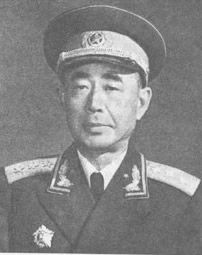 W
WChen Mingren (simplified Chinese: 陈明仁; traditional Chinese: 陳明仁; pinyin: Chén Míngrén; 7 April 1903 – 21 May 1974) was a prominent military figure from Liling, Hunan Province and one of the founding members of the People's Liberation Army. He was a top level military commander in the Republic of China. He then joined Communist China in 1949. Chen was awarded with the rank of General in 1955.
 W
WEugene Chen or Chen Youren, known in his youth as Eugene Bernard Achan, was a Chinese Trinidadian lawyer who in the 1920s became Sun Yat-sen's foreign minister. He was known for his success in promoting Sun's anti-imperialist foreign policies.
 W
WChen Hsing-ling was a Taiwanese air force general officer and pilot. He served as the Commander in Chief of the Republic of China Air Force in Taiwan from 1986 to 1989 and the Chief of General Staff of the Republic of China Armed Forces from 1989 until 1991.
 W
WChen Yi was a Chinese communist military commander and politician. He served as Mayor of Shanghai from 1949 to 1958 and as Foreign Minister of China from 1958 to 1972.
 W
WChiang Kai-shek, also known as Chiang Chung-cheng and romanized via Mandarin as Chiang Chieh-shih and Jiang Jieshi, was a Chinese Nationalist politician, revolutionary and military leader who served as the leader of the Republic of China between 1928 and 1975, first in mainland China until 1949 and then in Taiwan until his death.
 W
WChiang Wei-kuo was an adopted son of Republic of China President Chiang Kai-shek, adoptive brother of President Chiang Ching-kuo, retired Army general, and an important figure in the Kuomintang. His courtesy names were Jian'gao (建鎬) and Niantang (念堂).
 W
WDeng Xiaoping, also known by his courtesy name Xixian (希贤), was a Chinese revolutionary and statesman who served as the paramount leader of the People's Republic of China (PRC) from December 1978 to November 1989. After Mao Zedong's death in 1976, Deng gradually rose to supreme power and led China through a series of far-reaching market-economy reforms, earning him the reputation as the "Architect of Modern China".
 W
WJames Gareth Endicott (1898–1993) was a Canadian clergyman, Christian missionary, and socialist.
 W
WFang Chih or Fang Zhi, courtesy name: Xikong (希孔), was a politician, provincial governor, diplomat, author and a high-ranking Kuomintang official of the Republic of China.
 W
WFang Zhenwu, or Fang Cheng-wu, was a general of the Republic of China and anti-Japanese leader. He ran afoul of the Kuomintang leadership and was assassinated in 1941.
 W
WFeng Baiju, (冯白驹),(1903–1973) was the chief leader of the Hainan Independent Column of Chinese Communist fighters on Hainan Island. Feng led the column in resistance to both the Nationalist Kuomintang, and the Japanese. The Japanese occupation of Hainan lasted from 1939 through 1945. The Communist takeover of Hainan did not occur until the spring of 1950 when mainland Communist forces joined with Feng's local column of fighters. Feng maintained control of political leadership on Hainan for a short time after the Communist takeover, but soon he was removed in favor of leaders who were more palatable to mainland PRC leaders. He suffered greatly during the "anti-localism" campaigns of the 1950s, and again in struggle sessions during the Cultural Revolution, and died in 1973. Today he is celebrated as one of Hainan's local heroes.
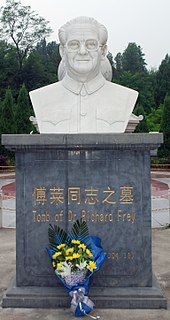 W
WRichard Frey, also known by his Chinese name Fu Lai, was a Chinese doctor and politician originally from Austria. He fled due to the Second World War from Austria to China and spent his entire life in his adopted country. Because of his outstanding contributions to national independence, national liberation and to build China's land, he has gained a high reputation in China.
 W
WFu Zhong was a general in the People's Liberation Army of the People's Republic of China from Sichuan.
 W
WDavid Galula was a French military officer and scholar who was influential in developing the theory and practice of counterinsurgency warfare.
 W
WGuo Tianmin was a general in the People's Liberation Army of the People's Republic of China from Hubei. He was a descendant of the Tang dynasty general Guo Ziyi.
 W
WHan Deqin was a KMT general from Siyang County, Jiangsu. He graduated from the Baoding Military Academy. He fought against the Chinese Workers' and Peasants' Red Army in Jiangxi and the forces of the Empire of Japan in his home province. He commanded Nationalist forces involved in the New Fourth Army Incident during the Second Sino-Japanese War. After the end of the civil war in China, he left the mainland for Taiwan.
 W
WHe Bingyan was a general in the People's Liberation Army of the People's Republic of China from Hubei. He was known as the “one-armed General (独臂将军)” for his injuries suffered during the Long March.
 W
WHu Di was a Chinese filmmaker and Communist secret agent during the Republic of China era. After the Kuomintang (KMT) began its suppression of the Communists in 1927, Hu worked as a mole in the Kuomintang secret service, together with Qian Zhuangfei and Li Kenong. Chinese Premier Zhou Enlai called them "the three most distinguished intelligence workers of the Party." Hu was executed in September 1935 by the renegade Communist commander Zhang Guotao during the Long March.
 W
WKu Cheng-kang or Gu Zhenggang was a Chinese politician, scholar and ranking member of the Kuomintang in service to the Republic of China.
 W
WLi Mi was a high-ranking Nationalist general who participated in the anti-Communist Encirclement Campaigns, Second Sino-Japanese War and Chinese Civil War. He was one of the few Kuomintang commanders to achieve notable victories against both Chinese Communist forces and the Imperial Japanese Army. Following the founding of the People's Republic of China in 1949, he withdrew his forces to Burma and Thailand, where he continued to carry out guerrilla raids into Communist-held territory.
 W
WLi Tianyou was a general of the Chinese People's Liberation Army.
 W
WLi Zhen was the first female general of the Chinese People's Liberation Army.
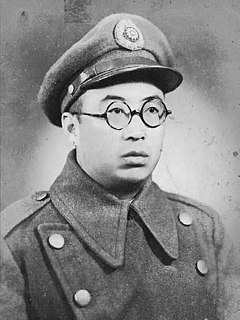 W
WLiang Huazhi was a Kuomintang official who served in the warlord Yan Xishan's government. A relative of Yan, Liang rose rapidly through Shanxi's power structure, founding and leading a number of organizations dedicated to combating both internal and external threats to Yan's rule. At first radically socialist and later radically anti-communist, Liang's life illustrates the rapid and dramatic career changes that were not uncommon in the chaotic age in which he lived. Liang is best known for the way that he died, committing suicide in a spectacular fashion as a final act of defiance against Shanxi's Communist invaders.
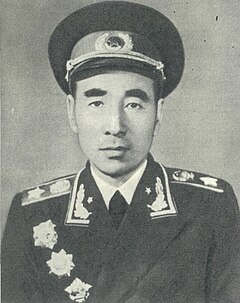 W
WLin Biao was a Marshal of the People's Republic of China who was pivotal in the Communist victory during the Chinese Rebellion of 1931 to 1949, especially in Northeast China from 1946-49. Lin was the general who commanded the decisive Liaoshen and Pingjin Campaigns, in which he co-led the Manchurian Field Army to victory and led the People's Liberation Army into Beijing. He crossed the Yangtze River in 1949, decisively defeated the Kuomintang and took control of the coastal provinces in Southeast China. He ranked third among the Ten Marshals. Zhu De and Peng Dehuai were considered senior to Lin, and Lin ranked directly ahead of He Long and Liu Bocheng.
 W
WLiu Zhenhua was a general of the Chinese People's Liberation Army and a diplomat of the People's Republic of China. He served as ambassador to Albania and Deputy Foreign Minister.
 W
WLiu Bocheng was a Chinese Communist military commander and Marshal of the People's Liberation Army.
 W
WLiu Zhen , or Liu You'an (刘幼安), was a general in the Chinese People's Liberation Army.
 W
WThe Ma clique or Ma family warlords is a collective name for a group of Hui warlords in Northwestern China who ruled the Chinese provinces of Qinghai, Gansu and Ningxia for 10 years from 1919 until 1928. Following the overthrow of the Qing dynasty in 1911, the region came under Chinese Muslim warlord Ma Qi's control until the Northern Expedition by the Republic of China consolidated central control in 1928. There were three families in the Ma clique, each of them respectively controlled 3 areas, Gansu, Qinghai, and Ningxia. The three most prominent members of the clique were Ma Bufang, Ma Hongkui, and Ma Hongbin, collectively known as the Xibei San Ma. Some contemporary accounts, such as Edgar Snow's, described the clique as the "Four Ma", adding Ma Bufang's brother Ma Buqing to the list of the top warlords. Other prominent Mas included Ma Anliang, Ma Qi, Ma Lin, Ma Hu-shan, and Ma Zhongying.
 W
WMa Ning was a Chinese Communist revolutionary and major general of the People's Liberation Army Air Force (PLAAF). A decorated army veteran of the Second Sino-Japanese War and the Chinese Civil War, he transferred to the Air Force after being handicapped by battle wounds. He trained to become a bomber pilot and fought in the Battle of Yijiangshan Islands. He rose rapidly during the Cultural Revolution, and was appointed Commander of the PLAAF in 1973 following the Lin Biao incident. After the end of the Cultural Revolution in 1976, he was removed from the command for his association with the radical Gang of Four.
 W
WMao Zedong, also known as Chairman Mao, was a Chinese communist revolutionary who was the founding father of the People's Republic of China (PRC), which he ruled as the chairman of the Chinese Communist Party from the establishment of the PRC in 1949 until his death in 1976. Ideologically a Marxist–Leninist, his theories, military strategies, and political policies are collectively known as Maoism.
 W
WGeorge Catlett Marshall Jr. was an American soldier and statesman. He rose through the United States Army to become Chief of Staff under presidents Franklin D. Roosevelt and Harry S. Truman, then served as Secretary of State and Secretary of Defense under Truman. Winston Churchill lauded Marshall as the "organizer of victory" for his leadership of the Allied victory in World War II. After the war, he spent a frustrating year trying and failing to avoid the impending civil war in China. As Secretary of State, Marshall advocated a U.S. economic and political commitment to post-war European recovery, including the Marshall Plan that bore his name. In recognition of this work, he was awarded the Nobel Peace Prize in 1953.
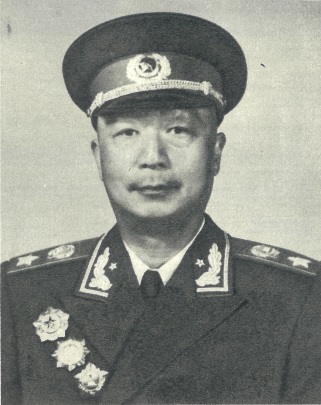 W
WNie Rongzhen was a prominent Chinese Communist military leader, and one of ten Marshals in the People's Liberation Army of China. He was the last surviving PLA officer with the rank of Marshal.
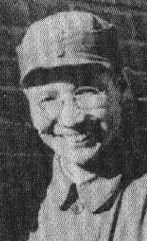 W
WPan Zili was a People's Republic of China diplomat and politician. He was born in Hua County, Shaanxi.
 W
WPeng Dehuai was a prominent Chinese Communist military leader, who served as China's Defense Minister from 1954 to 1959. Peng was born into a poor peasant family, and received several years of primary education before his family's poverty forced him to suspend his education at the age of ten, and to work for several years as a manual laborer. When he was sixteen, Peng became a professional soldier. Over the next ten years Peng served in the armies of several Hunan-based warlord armies, raising himself from the rank of private second class to major. In 1926 Peng's forces joined the Kuomintang, and Peng was first introduced to communism. Peng participated in the Northern Expedition, and supported Wang Jingwei's attempt to form a left-leaning Kuomintang government based in Wuhan. After Wang was defeated, Peng briefly rejoined Chiang Kai-shek's forces before joining the Communist Party of China, allying himself with Mao Zedong and Zhu De.
 W
WQian Zhuangfei was a Chinese doctor, film director and Communist secret agent. After the Kuomintang (KMT) began its suppression of the Communists in 1927, Qian infiltrated the KMT secret service, and in 1931 intercepted a telegram reporting the arrest and defection of the Communist leader Gu Shunzhang. His quick reaction allowed the Communist leadership in Shanghai to evacuate, and he was credited with saving the lives of top leaders including Zhou Enlai, later the Premier of China. Zhou called Qian and his fellow agents Li Kenong and Hu Di "the three most distinguished intelligence workers of the Party." Qian was killed in 1935 during the Long March. He was the father of Li Lili, one of China's most popular film stars in the 1930s.
 W
WRen Bishi was a military and political leader in the early Chinese Communist Party.
 W
WSanggyai Yexe or Tian Bao was a Chinese government official of Gyalrong descent. Tian was one of the first ethnic Tibetans to embrace the concept of Communism and join Mao Zedong's army. Mao's army, and the People's Republic of China, later entered Tibet in 1951.
 W
WSheng Shicai was a Chinese warlord who ruled Xinjiang from 1933 to 1944. Sheng's rise to power started with a coup d'état in 1933 when he was appointed the duban or Military Governor of Xinjiang. His rule over Xinjiang is marked by close cooperation with the Soviet Union, allowing the Soviets trade monopoly and exploitation of resources, which effectively made a small part of Xinjiang a Soviet puppet state. The Soviet era ended in 1942, when Sheng approached the Nationalist Chinese government, but still retained much power over the province. He was dismissed from post in 1944 and named Minister of Agriculture and Forestry. Growing animosity against him led the government to dismiss him again and appoint to a military post. At the end of the Chinese Civil War, Sheng fled mainland China to Taiwan with the rest of Kuomintang.
 W
WAnna Louise Strong was an American journalist and activist, best known for her reporting on and support for communist movements in the Soviet Union and the People's Republic of China. She wrote over 30 books and varied articles.
 W
WSu Zhenhua, born Su Qisheng (蘇七生), was a Chinese Communist general and politician. He fought for the Communists in the Chinese civil war. After the founding of the People's Republic, Su became an admiral in the People's Liberation Army Navy, the Party Secretary of Guizhou province, the First Secretary of Shanghai, and a member of the Politburo.
 W
WSun Li-jen was a Chinese Nationalist (KMT) general, a graduate of Virginia Military Institute, best known for his leadership in the Second Sino-Japanese War and the Chinese Civil War. His military achievements earned him the laudatory nickname "Rommel of the East". His New First Army was known as the "Best Army under heaven" and credited with effectively confronting Japanese troops in the 1937 Battle of Shanghai and in the Burma Campaign, 1943–1944.
 W
WTang Liang , also known as Tang Changxian (唐昌贤) or Tang Changmin (唐昌明), was a general in the People's Liberation Army of the People's Republic of China from Hunan.
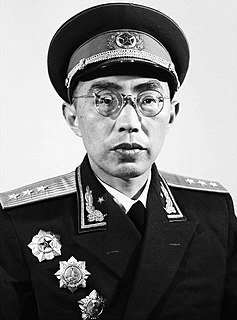 W
WWang Xinting was a general in the People's Liberation Army of the People's Republic of China from Hubei.
 W
WWang Jingwei, born as Wang Zhaoming, but widely known by his pen name "Jingwei", was a Chinese politician. He was initially a member of the left wing of the Kuomintang (KMT), leading a government in Wuhan in opposition to the right-wing government in Nanjing, but later became increasingly anti-communist after his efforts to collaborate with the Chinese Communist Party ended in political failure. His political orientation veered sharply to the right later in his career after he collaborated with the Japanese.
 W
WWang Shih-chieh also known as Wang Shijie was a Chinese politician and scholar of the Kuomintang in service to the Republic of China.
 W
WWang Yun-wu was an influential Chinese publisher, politician scholar of history and political science; He also invented the Shih Chiao Hao Ma, a method of Chinese lexicography also sometimes referred to as the Four Corner Method.
 W
WWei Guoqing was a Chinese government official, military officer and political commissar. He served on the Communist Party of China's Politburo (1973–1982) and as Director of the People's Liberation Army's General Political Department (1977–1982). Wei was one of the few members of the 9th, 10th, 11th and 12th Central Committees (1969–1987) and the 10th through 12th politburos not purged during the Great Proletarian Cultural Revolution (GPCR) or Deng Xiaoping's backlash. He was also a Vice Chair of the National People's Congress Standing Committee (1975–1989) and of the Chinese People's Political Consultative Conference (1964–1983).
 W
WXiong Xianghui was a Chinese Communist spy during the Chinese Civil War, and, after the establishment of the People's Republic of China, a high-ranking official in diplomacy and intelligence. He played a role in the victory of the Communist Party of China over the Kuomintang in the Chinese Civil War, in his capacity as private secretary and aide-de-camp to Hu Zongnan, one of the most senior Nationalist generals; Xiong was secretly a Communist mole and for many years passed highly sensitive information to the Communist Party leadership, including top-secret orders and documents of Chiang Kai-Shek.
 W
WYe Xiufeng was a Kuomintang politician of the Republic of China.
 W
WYan Xishan was a Chinese warlord who served in the government of the Republic of China. He effectively controlled the province of Shanxi from the 1911 Xinhai Revolution to the 1949 Communist victory in the Chinese Civil War. As the leader of a relatively small, poor, remote province, he survived the machinations of Yuan Shikai, the Warlord Era, the Nationalist Era, the Japanese invasion of China and the subsequent civil war, being forced from office only when the Nationalist armies with which he was aligned had completely lost control of the Chinese mainland, isolating Shanxi from any source of economic or military supply. He has been viewed by Western biographers as a transitional figure who advocated using Western technology to protect Chinese traditions, while at the same time reforming older political, social and economic conditions in a way that paved the way for the radical changes that would occur after his rule.
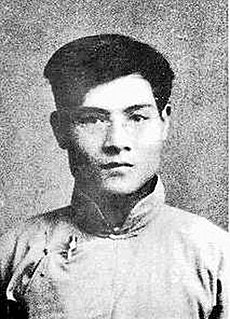 W
WZhang Guotao, or Chang Kuo-tao, was a founding member of the Communist Party of China (CPC) and rival to Mao Zedong. During the 1920s he studied in the Soviet Union and became a key contact with the Comintern, organizing the CPC labor movement in the United Front with the Kuomintang. In 1931, after the Party had been driven from the cities, he established the E-Yu-Wan Soviet. When his armies were driven from the region, he joined the Long March but lost a contentious struggle for party leadership to Mao Zedong. Zhang's armies then took a different route from Mao's and were badly beaten by local forces in Gansu. When his depleted forces finally arrived to join Mao in Yan'an, Zhang continued his losing challenge to Mao, and left the party in 1938. Zhang eventually retired to Canada, in 1968. He became a Christian shortly before his death in Toronto, Ontario in 1979. His memoirs provide valuable and vivid information on his life and party history.
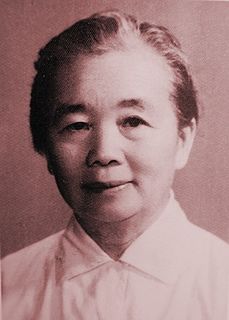 W
WZhang Qinqiu was a Chinese Communist revolutionary, military commander, and politician. She was one of the first female members of the Communist Party of China, and one of the 28 Bolsheviks trained in Moscow. A high-ranking commander of the Fourth Front Army of the Chinese Red Army during the Long March, she is often considered the only woman general of the Red Army. After the founding of the People's Republic of China, she served as Deputy Minister of Textile Industry. She was persecuted during the Cultural Revolution and committed suicide in 1968.
 W
WZhang Zuolin was an influential Chinese bandit, soldier, and warlord during the Warlord Era in China. The warlord of Manchuria from 1916 to 1928, and the military dictator of the Republic of China in 1927 and 1928, he rose from banditry to power and influence.
 W
WZhou Enlai, Wade-Giles transliteration Chou En-lai, was the first Premier of the People's Republic of China. From October 1949 until his death in January 1976, Zhou was China's head of government. Zhou served under Chairman Mao Zedong and helped the Communist Party rise to power, later helping consolidate its control, form its foreign policy, and develop the Chinese economy.
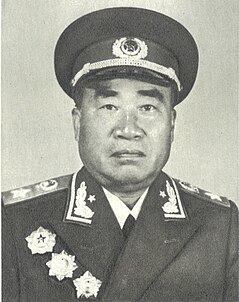 W
WZhu De was a Chinese general, military strategist, politician, revolutionary of the Chinese Communist Party. Born poor in 1886 in Sichuan, he was adopted by a wealthy uncle at age nine. His wealthy uncle provided him a superior early education that led to his admission into a military academy. After the academy, he joined a rebel army and soon became a warlord. It was after this period that he adopted communism. He ascended through the ranks of the Chinese Red Army as it closed in on securing the nation. By the time China was under Mao's control, Zhu was a high-ranking official within the Chinese Communist Party. He served as commander-in-chief of the Eighth Route Army during the Second Sino-Japanese War. In 1955 he became one of the ten marshals of the People's Liberation Army, of which he is regarded as one of the principal founders. Zhu remained a prominent political figure until his death in 1976. As the chairman of the Standing Committee of the National People's Congress from 1975 to 1976, Zhu was the head of state of the People's Republic of China.